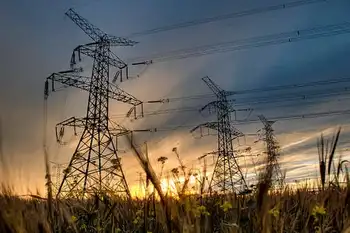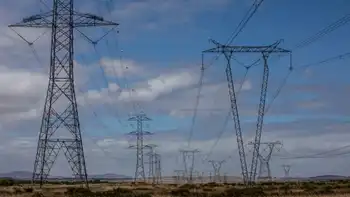Coal plant looks to biomass for greener future
NORTH YORKSHIRE, ENGLAND - Solar, wind and wave power garner much of the focus in the world's search for a clean energy supply, yet a less glamorous source is increasingly being used to generate electricity.
Biomass, or plant matter or other organic material, is being burned in power stations around the world and is regarded by some in the electricity industry as the world's fourth largest energy source after coal, oil and gas.
Britain's biggest coal-burning power station, Drax in North Yorkshire, generates 7 percent of the UK's electricity — a sizeable chunk of that from biomass.
"Twelve percent of the fuel that we can burn today is biomass so that means 12 percent of the electricity comes from biomass which is a renewable fuel," said Peter Emery, production director at Drax.
Drax has the world's biggest coal and biomass co-burning facility, able to use 1.4 million tones a year of plant material to drive a steam turbine and generate electricity.
Burning biomass returns to the atmosphere the same carbon dioxide that the plants took up when they were growing, and so can cut net emissions compared with fossil fuels.
"We tend to burn material that is already produced but is not being put to good use," said Emery. "That is how you industrialize this process and how you keep it cost effective."
The power station is burning four main types of biomass, forestry waste, agricultural waste, some wood waste and energy crops. It sources these from the UK and overseas.
Around 100 local farmers have entered into contracts with the power station to supply one kind of energy crop, Miscanthus, or Asian elephant grass.
Chris Bradley owns Whinney Moor Farm in East Yorkshire, and says Miscanthus grows 3 meters tall and thrives on poor soils.
"I think putting this on grade one or two land is probably not an option and possibly not even morally right.... But certainly on the lower grade soils like I've done — it is a good option."
Energy crops are often blamed for pushing up world food prices. Drax said it would not contract farmers planning to convert from cereals such as wheat and added that Miscanthus was unlikely to be economic on high-grade land, given currently high grain prices.
Miscanthus is being promoted alongside willow, sawdust and straw as biomass for producing heat and power when burned, without causing net emissions of greenhouse gas carbon dioxide.
Britain is leading trials of the crop in Europe, with harvests growing more than tenfold in the past five years to an area twice the size of Manhattan, government data show.
Drax also burns straw, peanut husks and sunflower shells and has built an automated straw pelleting plant, just the start of a long period of transition.
"We are a coal-fired power station and we want to contribute to moving toward a low carbon economy and we see biomass as a way to do that," said Drax's Emery.
"Carbon capture and storage as well may have a role, but we see that as five and 10 years down the road. If you are trying to reduce CO2 today, urgently, then this is a good way to do it."
Emery said the electricity industry faced radical change as part of a move from a fossil fuel-powered economy to a renewable energy-powered one.
"It's going to change the electricity industry completely and we are in a transition period. Nobody quite knows what it will look like in 30 years time. We see coal co-firing with biomass as a very good transition technology, moving to 100 percent biomass longer term and carbon capture and storage."
Drax said burning biomass releases around 90 percent less carbon than burning coal and between 50 and 90 percent less than burning gas.
Related News

Ontario Providing Support for Industrial and Commercial Electricity Consumers During COVID-19
TORONTO - Through an emergency order passed today, the Ontario government is taking steps to defer a portion of Global Adjustment (GA) charges for industrial and commercial electricity consumers that do not participate in the Regulated Price Plan for the period starting from April 2020. This initiative is intended to provide companies with temporary immediate relief on their monthly electricity bills in April, May and June 2020. The government intends to keep this emergency order in place until May 31, 2020, and subsequent regulatory amendments would, if approved, provide for the deferral of these charges for June 2020 as well.
This…




